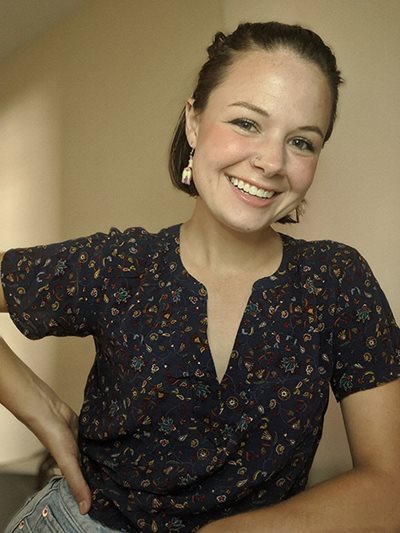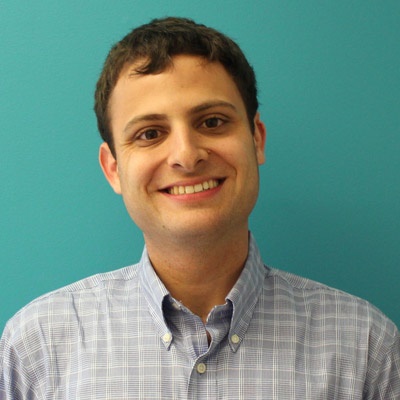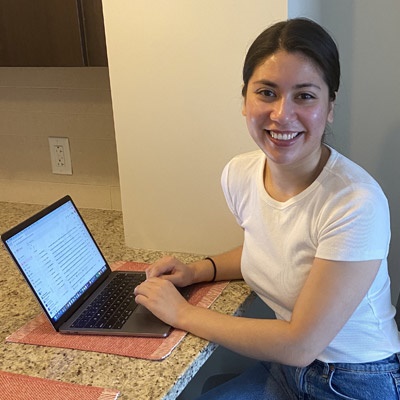The AmeriCorps VISTA volunteers at The Neighborhood Developers Inc. (TND), in Chelsea, Massachusetts, had been at their various assignments for just over seven months when everything changed. Starting in March, when the spread of COVID also caused the spread of hard financial times, there were new needs. For the VISTAs (Volunteers in Service to America), there were new responsibilities. And the four volunteers say they now have a better understanding about the way their NeighborWorks nonprofit works — and about how to help their communities.
 "My title has changed a few times," says Laurel Robinson, who works in communications for TND's CONNECT program as a VISTA, a federally funded national service program focused on fighting poverty.
"My title has changed a few times," says Laurel Robinson, who works in communications for TND's CONNECT program as a VISTA, a federally funded national service program focused on fighting poverty.
TND's CONNECT had intended to hire a communications manager, but when COVID hit, they froze the position. "I ended up doing a lot more," Robinson says. She created a COVID-related resource page, updated it daily, and, with the other volunteers, established a new hotline. Like the other VISTAS, too, she suddenly became an expert in unemployment, rental assistance and disseminating information.
"All of us reconfigured our roles and how we fit together," Robinson says. Many outside neighborhood organizations came together to help each other, too.
NeighborWorks America sponsors one of the largest national AmeriCorps VISTA programs in the United States, says Debbie S. Wise, senior manager at NeighborWorks for workforce development. The AmeriCorps Vista program began in 1965. Since NeighborWorks' VISTA program launched in 2009, more than 1,000 VISTAs have completed service with the NeighborWorks network. Goals of the program include increasing capacity of local NeighborWorks; attracting and retaining new and diverse talent to the community development field; and contributing to a growing sense of national service. The work at TND is just one example, but a good one.
"I'm extremely proud to be working with The Neighborhood Developers at this time," Robinson says. "We really demonstrated our commitment to the community and we're working so hard to do everything in our power to help the people in the community that are experiencing hardships. Regardless of what personal things we're dealing with at home, we're still putting the focus on making sure the community is getting as much relief as possible. And when we work with other organizations, it's not about getting credit; it's about doing something good."
Robinson says that there were times, in her first months at the organization, that some of her work seemed a little repetitive. Now, she says, she feels invested professionally and emotionally.
And while traditionally, VISTAs are not supposed to do direct service, they got a waiver this spring and were able to help get food to those who needed it.
"Our crew of VISTA volunteers made it possible for us to launch a scalable, volunteer-supported emergency assistance hotline within a week of our state's shutdown, and deploy over half a million dollars in direct assistance to families whose finances were turned upside down, while also keeping on top of an intense flow of incoming and outgoing communications," says Stefanie Shull, TND's director of CONNECT. "Our regular staff had enough on their plates in re-tooling their service delivery and their own lives for remote work, so the extra capacity was essential to our ability to adapt to the very different demands of a crisis environment."
Outside of annual tax prep, CONNECT had never utilized volunteers for service delivery before, Shull says. "The COVID crisis changed all that. An army of about 40 people runs our hotline, many of them part-time volunteers managed by our VISTAs."
NeighborWorks' Wise says the volunteers "enhance the capacity of network organizations to create or expand programs designed to empower individuals and communities in overcoming poverty. During the pandemic they have acted swiftly and creatively finding new ways to continue their work to meet emerging needs."
Before VISTA, Robinson was a Peace Corps volunteer in Sierra Leone. She needed more professional experience to find a job at a nonprofit, she says, so she joined AmeriCorps. Now, she has that experience.
Vartika Govil moved to Boston to earn her bachelor's degree in health science at Boston University. The main appeal of becoming a VISTA volunteer, she says, was the opportunity to get embedded in the community and the CONNECT program's holistic approach to working with people was a perfect fit.
Pre-COVID, her responsibilities included increasing economic opportunity and mobility for low-income community members by developing a formalized volunteer program plan to engage corporate and community volunteers. Once COVID hit, she took charge of figuring out RAFT (Residential Assistance for Families in Transition) and how to help people get it. "There's a crisis," she says. "People are unemployed and not able to pay their rent. RAFT had received another $5 million from the state. How do we best utilize that for our community members?"
Govil manages RAFT and co-manages VITA (Volunteer Income Tax Assistance) on the CONNECT hotline. "It started with one or two people, but I am now managing 25 volunteers just on the RAFT hotline," she says.
Govil also became a VITA volunteer herself and was able to help move the program from in-person to virtual, once state orders required people to stay home. "It's been a very fulfilling experience," she says. "I wouldn't have imagined managing so many people at once and working in multiple fields to get this experience." She says seeing the people she's able to help – "their good wishes and ‘God bless you's' -- is so gratifying."
 Kavish Gandhi was on the technical end of things, helping move the tax assistance system online, and then helping with the hotline. "All of our services needed to shift," he says. "It became clear that we had to make everything virtual."
Kavish Gandhi was on the technical end of things, helping move the tax assistance system online, and then helping with the hotline. "All of our services needed to shift," he says. "It became clear that we had to make everything virtual."
They had to assist with information, with unemployment – all of it, he says. They also needed to recruit volunteers. Before that, Gandhi, a math major, was in a data position. "Data is important for a lot of reasons: To make programs better, to measure outcomes, to access funding." Post COVID, he had to use data in different ways and to turn his attention to system setups – like for the CONNECT hotline. "There was a mad scramble to record messages and to record them again in Spanish," he says. "Over the course of a few days, we were trying to come up with a system and launch it."
Gandhi says he's always been interested in housing and homelessness issues and that the VISTA position was the perfect fit. Working on the COVID response "really connected me to the community," he says. "It also showed him institutional challenges up close. "We had to innovate fast. A lot of what we had to do had to happen immediately. If mistakes were made, they were made. We had to adjust on the fly. It was always a work in progress."
Eva Daniggelis had been interested in nonprofit work and thought become an AmeriCorps VISTA would give her a feel for what it would be like. She'd heard that working at nonprofits required flexibility, "that you'd have to change on a dime and take a role you hadn't signed up for originally. It's one thing to hear it, but it's another thing to experience it, especially on this scale with the pandemic."
Pre-COVID, her job had been working on financial education programming. They'd been delivering classes in person and were forging new partnerships. "Then, all of that ‘in person' stuff just got paused," she says.
Her "new normal" became helping find assistance for those who needed it, funneling grant money right back out to their clients. "Working in the community, I always felt like we were at the tip of the iceberg," she says. "I knew there were barriers and that we were trying to chip away at them. With the pandemic, it exposed the rest of the iceberg." She says she watched coaches, who had been working with clients for years to achieve financial stability, despair as those clients, finally on a positive trajectory, suffered huge setbacks with COVID and the unemployment that accompanied it. "It felt like all of their years of work had been undone."
Daniggelis says plans to continue working with nonprofits, and the experience narrowed down her focus. "I want to shift to affordable housing," she says.
For more about the NeighborWorks VISTA program, visit this website.
08/25/2020

